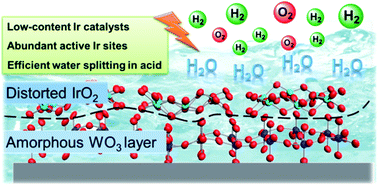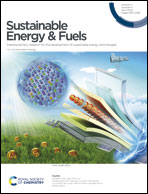Amorphous WO3 induced lattice distortion for a low-cost and high-efficient electrocatalyst for overall water splitting in acid†
Abstract
The development of highly active and durable catalysts for water oxidation under acidic conditions is necessary but challenging for renewable energy conversion. Ir-based catalysts are highly efficient for water oxidation in acid, but their large scale application is hindered by the high cost and scarcity of iridium. Herein, we use an amorphous WO3 induced lattice distortion (AWILD) strategy to reduce the Ir content to only 2 wt% in the final material. The optimized hybrid nitrogen-doped carbon (NC)/WO3/IrO2 can efficiently catalyze water oxidation with a low overpotential of 270 mV at 10 mA cm−2 current density (η10) and a high turnover frequency of over 2 s−1 at 300 mV overpotential in 0.5 M H2SO4, a performance that surpasses that of commercial IrO2 significantly. Introducing the layer of amorphous WO3 between IrO2 nanoparticles and NC can distort the lattice of IrO2, exposing more highly active sites for water oxidation. The AWILD effect compensates for the lower Ir content and dramatically reduces the cost of the catalyst without sacrificing the catalytic activity. Additionally, this catalyst also exhibits high activity in acid for hydrogen evolution with only 65 mV of η10 attributed to the AWILD effect, exhibiting efficient bifunctionality as a Janus catalyst for overall water splitting. The AWILD approach provides a novel and efficient strategy for low-cost and highly efficient electrocatalysts for acidic overall water splitting with an extremely low content of noble metals.



 Please wait while we load your content...
Please wait while we load your content...